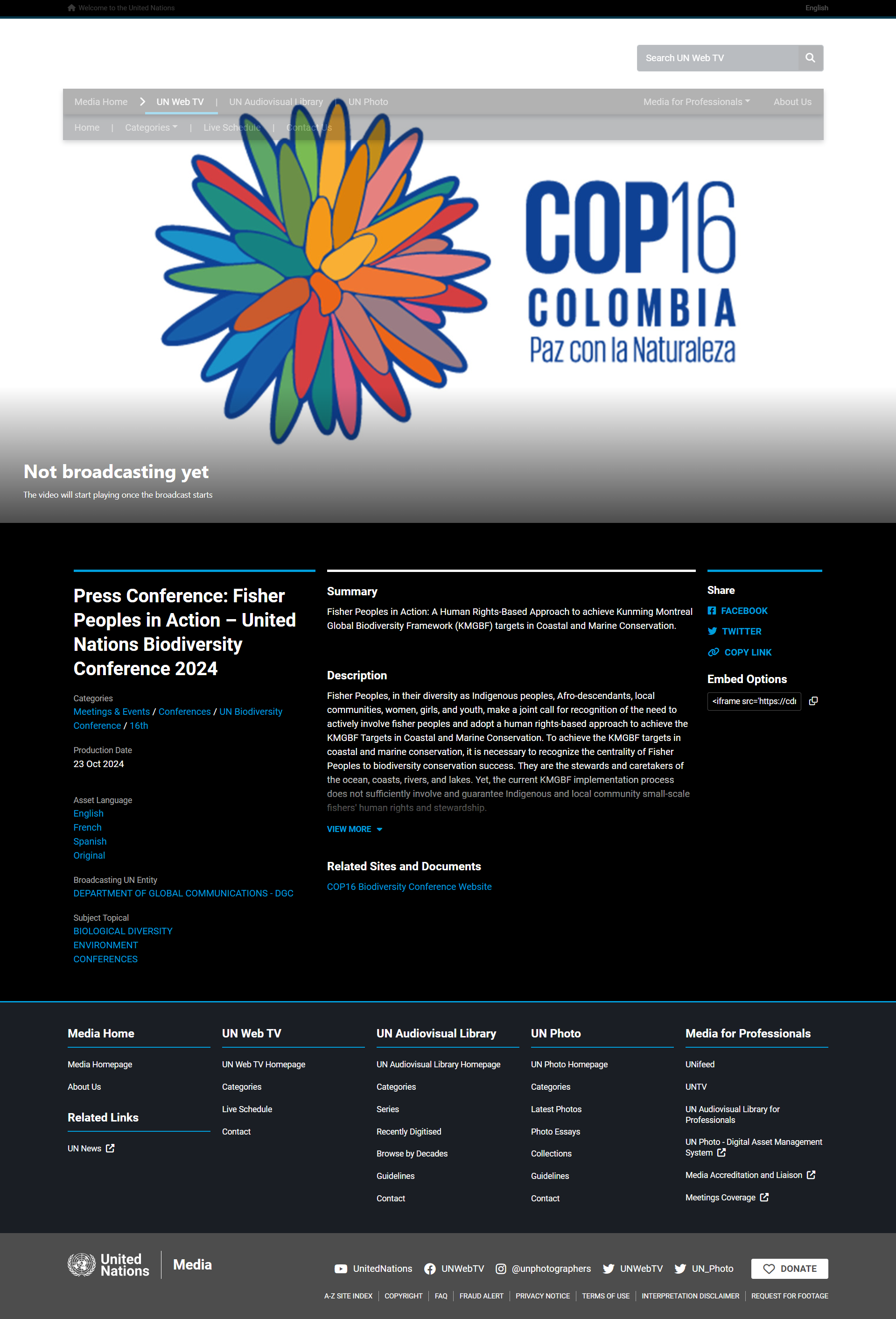
Water covers 70 percent of the Earth. Marine and freshwater environments sustain an abundance of life in its spectacular diversity. Through our history, small-scale fishing communities have interacted and depended on these living resources. A threat to aquatic environments is a danger to artisanal fishers.
Their protection and stewardship are essential to the communities and cultures they sustain. This relationship is a framework to manage conflicts and improve the quality of life and livelihood of small-scale fishers. It was recognized in the UN Convention on Biological Diversity.
Governments increasingly designate marine protected areas (MPAs) for conservation and management. This legal instrument does help but its implementation has raised serious concerns. Target-driven expansion of MPAs is fixated on quantitative goals. This has hit the rights, livelihoods and sustainable use practices of small-scale fishing communities. MPAs—created often in a non-consultative and non-participatory manner—have focused on regulating/restricting their fisheries, failing to recognize their sustainable livelihoods, culture and survival.
It is imperative that protection efforts are grounded in principles of sustainable use. That their processes are inclusive and recognize</b< traditional local systems of knowledge and governance, building upon them. Artisanal fishers must be the frontline of marine biodiversity conservation. There is an urgent need for systematic improvements on all such matters.
A range of ICSF’s initiatives highlight the social and political dimensions of conservation. The importance of livelihoods of poor and vulnerable communities, of their participation and consultation. The co-management of resources by fishing communities, based on a human rights approach to conservation.

Fisher Peoples in Action: A Human Rights-Based Approach to achieve Kunming Montreal Global Biodiversity Framework (KMGBF) targets in Coastal and Marine Conservation. Description: Fisher Peoples, in their diversity as Indigenous peoples, Afro-descendants, local communities, women, girls, and youth, make a joint call for recognition of the need to actively involve fisher peoples and adopt a human rights-based approach to achieve the KMGBF Targets in Coastal and Marine Conservation. To achieve the KMGBF targets in coastal and marine conservation, it is necessary to recognize the centrality of Fisher Peoples to biodiversity conservation success. They are the stewards and caretakers of the ocean, coasts, rivers, and lakes. Yet, the current KMGBF implementation process does not sufficiently involve and guarantee Indigenous and local community small-scale fishers’ human rights and stewardship. For more details, please visit: https://webtv.un.org/en/asset/k15/k15icg47f5
This paper reviews marine biodiversity, coastal communities’ traditional ecological knowledge systems (TEKS) and the biodiversity they have conserved, and the industrial exploitation of marine genetic resources; it then analyzes TRIPS...
This study focuses on the carrying and assimilation capacity of the Gulf of Kutch in keeping with its intertidal peculiarities. The unchecked industrialization is fast depleting the corals of Gulf...
This study focuses on the legal framework for sea turtle protection in the Indian State of Orissa. It documents the social consequences of turtle protection measures on fishing communities, and...
The study focuses on fishing community issues in the Sundarban Tiger Reserve (STR). It provides an overview of the legal framework, and design and implementation of fishing regulations, and documents...
A pictorial training material on ecosystem approach to fisheries management as part of the ICSF-BOBLME initiated training activity in six languages (English, Bangla, Thai, Tamil, Burmese, and Bahasa) English https://icsf.net/wp-content/uploads/2013/09/930.ICSF210.pdf...
The marine protected area network in India has been used as a tool to manage natural marine resources for biodiversity conservation and for the well-being of people dependent on it....
By taking an intense look at the concerns revolving around turtle conservation and the protection of the livelihoods of traditional fishing communities, this film offers some insights into the dilemmas...
This dossier puts together a collection of articles from the pages of SAMUDRA Report, the triannual journal of ICSF. The articles show that conservation and livelihoods are closely intertwined, and...
This report of research undertaken jointly by CoopeSoliDar R.L and the ICSF focuses on the social dimensions of marine conservation, and assesses the experiences of coastal and fishing communities in...
Subsidiary Body on Implementation Fifth meeting Cali, 16–18 October 2024: Item 2 of the provisional agenda – Review of implementation of the Kunming-Montreal Global Biodiversity Framework, including means of implementation...
Subsidiary Body on Implementation Fifth meeting Cali, 16–18 October 2024: Item 2 of the provisional agenda – Review of implementation of the Kunming-Montreal Global Biodiversity Framework, including means of implementation...
Subsidiary Body on Implementation Fifth meeting Cali, 16–18 October 2024: Item 2 of the provisional agenda – Review of implementation of the Kunming-Montreal Global Biodiversity Framework, including means of implementation...
Subsidiary Body on Implementation Fifth meeting Cali, 16–18 October 2024: Item 2 of the provisional agenda – Review of implementation of the Kunming-Montreal Global Biodiversity Framework, including means of implementation...
Statement by Global Youth Biodiversity Network (GYBN) at United Nations Biodiversity Conference COP 16 / CP-MOP 11 / NP-MOP 5, Cali, Colombia, 21 October – 1 November 2024 Statement is available...
Statement by Office of the United Nations High Commissioner for Human Rights (OHCHR) at United Nations Biodiversity Conference COP 16 / CP-MOP 11 / NP-MOP 5, Cali, Colombia, 21 October –...
Statement by Food and Agriculture Organization of the United Nations (FAO) at United Nations Biodiversity Conference COP 16 / CP-MOP 11 / NP-MOP 5, Cali, Colombia, 21 October – 1 November...
Statement by United Nations Entity for Gender Equality and the Empowerment of Women (UN Women) at United Nations Biodiversity Conference COP 16 / CP-MOP 11 / NP-MOP 5, Cali, Colombia,...
Statement by International Indigenous Forum on Biodiversity (IIFB), 2024 at United Nations Biodiversity Conference COP 16 / CP-MOP 11 / NP-MOP 5, Cali, Colombia, 21 October – 1 November 2024...
Statement on Agenda Item 8: Progress on the Preparation of Targets and Updating of National Biodiversity Strategies and Action Plans by Parties in line with the Kunming-Montreal Global Biodiversity Framework...